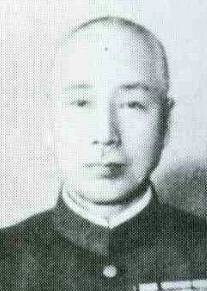Mutō Nobuyoshi
Baron Mutō Nobuyoshi ( Japanese 武 藤 信義 ; * July 15, 1868 in Saga , Japan ; † July 27, 1933 in Shinkyō , Manchukuo ) was a field marshal of the Imperial Japanese Army .
Life
Mutō was born into a former samurai family in 1868 . After attending school, he attended the army officer school and fought as a lieutenant in the infantry after graduating in the First Sino-Japanese War . After the war and his promotion to captain, he was sent twice to Russia as a military attaché and stayed in Vladivostok and Odessa . During this time he learned to speak fluent Russian. He also fought in the Russo-Japanese War , after which he was promoted first to major and then to colonel. In this rank he served in the Imperial Guard, among other things .
From 1915 to 1916 Mutō served in the maneuvers department of the First Office of the General Staff . In 1917 he switched to military intelligence , where he was responsible for actions in Harbin , Irkutsk and Omsk , among other things . Between 1919 and 1921 he served again in administrative posts in the General Staff before he took command of the 3rd Division and took part in the Siberian Intervention .
Mutō returned to Japan in 1922, where he was Deputy Chief of Staff on the General Staff until 1925, before becoming a member of the Supreme War Council for a year . Subsequently, he was briefly in command of the Tokyo Defense Command before he became Commander-in-Chief of the Kwantung Army in Manchuria from July 28, 1926 to August 26, 1927 . Afterwards he was inspector general of military training until May 26, 1932 and then returned to Manchuria, where he was commander in chief of the army of the puppet state of Manchukuo, which was founded after the Japanese occupation of Manchuria , until his death . At the same time he was again Commander in Chief of the Kwantung Army and Governor General of the Kwantung lease area . As chief representative of Tennō Hirohito , he signed the Japan-Manchukuo Protocol of 1932. In 1933, he oversaw the Japanese Operation Nekka , which had the goal of conquering the Chinese province of Deer as part of Manchukuo. In the course of this operation he was promoted to field marshal.
Mutō was one of the few high-ranking Japanese military men who sharply criticized the situation in Manchukuo and the Japanese politics there under the secret service agent Doihara Kenji , although he was largely ignored. For this reason, it is not entirely clear whether he died of an illness or committed seppuku in the summer of 1933 .
He was also awarded the Order of the Rising Sun 1st class on November 1, 1920 .
Posthumously he received the title of danshaku (baron), the order of the rising sun was upgraded to the special level of the order of the paulownia flower, as well as the order of the golden consecration 1st class. His tomb is in the Gokoku-ji Temple in Tokyo, and his marshal's sword is exhibited in the Yūshūkan Museum of the Yasukuni Shrine .
Remarks
- ↑ 旧 ・ 勲 一等 旭日 大 綬 章 受 章 者 一 覧 (戦 前 の 部) . (No longer available online.) The Nakano Library, archived from the original on May 10, 2015 ; Retrieved June 18, 2011 (Japanese). Info: The archive link was inserted automatically and has not yet been checked. Please check the original and archive link according to the instructions and then remove this notice.
- ↑ 勲 一等 旭日 桐花 大 綬 章 受 章 者 一 覧 . The Nakano Library, accessed June 18, 2011 (Japanese).
- ↑ 旧 ・ 金 鵄 勲 章 受 章 者 一 覧 . The Nakano Library, accessed June 18, 2011 (Japanese).
literature
- Herbert B. Bix: Hirohito and the Making of Modern Japan. Harper Perennial, 2001, ISBN 0-06-093130-2 .
- Alvin Coox: Nomonhan: Japan Against Russia, 1939. Stanford University Press, 1990, ISBN 0-8047-1835-0 .
- Trevor N. Dupuy : Encyclopedia of Military Biography. IB Tauris, 1992, ISBN 1-85043-569-3 .
Web links
- Mutō Nobuyoshi in the Database of Generals of World War II. Retrieved June 17, 2011.
| personal data | |
|---|---|
| SURNAME | Mutō Nobuyoshi |
| ALTERNATIVE NAMES | 武 藤 信義 (Japanese) |
| BRIEF DESCRIPTION | Japanese field marshal |
| DATE OF BIRTH | July 15, 1868 |
| PLACE OF BIRTH | Saga (saga) |
| DATE OF DEATH | July 27, 1933 |
| Place of death | Changchun |
